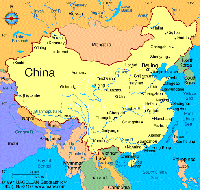China finalizes oil deal in Kenya
Chinese President Hu Jintao said Friday that his government follows a policy of "non-interference in others' affairs" as he finalized yet another oil deal in Africa, the poorest and most corrupt continent in the world but one that is rich in natural resources.

Hu is on his second trip to Africa since he became leader three years ago, showing his keen interest in the continent, particularly its oil. Africa also has become a new market for Chinese exporters, in the last five years, China's trade with Africa has grown fourfold, to US$40 billion ( Ђ 32 billion) in 2005.
"In our dealings with African countries we have all along followed the principle that we have to respect ... the political model followed by African countries," Hu said during a news conference with Kenyan President Mwai Kibaki on the lawn of the State House.
Hu arrived in Kenya on Thursday night; his three-day visit here is the final stop on a tour that has included the United States, Saudi Arabia, Morocco and Nigeria.
Also Friday, Chinese and Kenyan officials signed a series of deals, including one that allows for oil exploration in Kenya by the Chinese National Oil Onshore Co. Earlier in the week, Hu signed major business deals with oil-rich Nigeria.
Critics of China's influence in Africa wonder about the effect of the communist nation's increasing economic impact. China, a veto-wielding U.N. Security Council member, has offered key diplomatic support to some governments shunned by the West, like Sudan and Zimbabwe.
"In Kenya, the West is trying to promote an anti-corruption agenda. There is a fear that Chinese intervention has resulted in negative effects on that process," said Duncan Innes-Ker, an analyst at the Economist Intelligence Unit in London.
Innes-Ker noted that China "has always been very keen to build relationships with developing countries. It has a long history of sending doctors to Africa and providing assistance."
But, he added: "I don't think China's foreign policy is ever really driven by philanthropy. ... The government's agenda tends to be driven by Chinese national interests."
On the back of an economy that is heading into its fourth year of 10 percent growth and has become the world's third-largest trader, Chinese leaders have won over Southeast Asian neighbors with trade, raised China's investment and presence in Africa and Latin America and gained access to oil from strategically shaky Central Asia and the Middle East, reports the AP.
I.L.
Subscribe to Pravda.Ru Telegram channel, Facebook, RSS!




